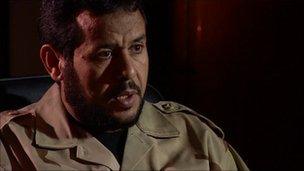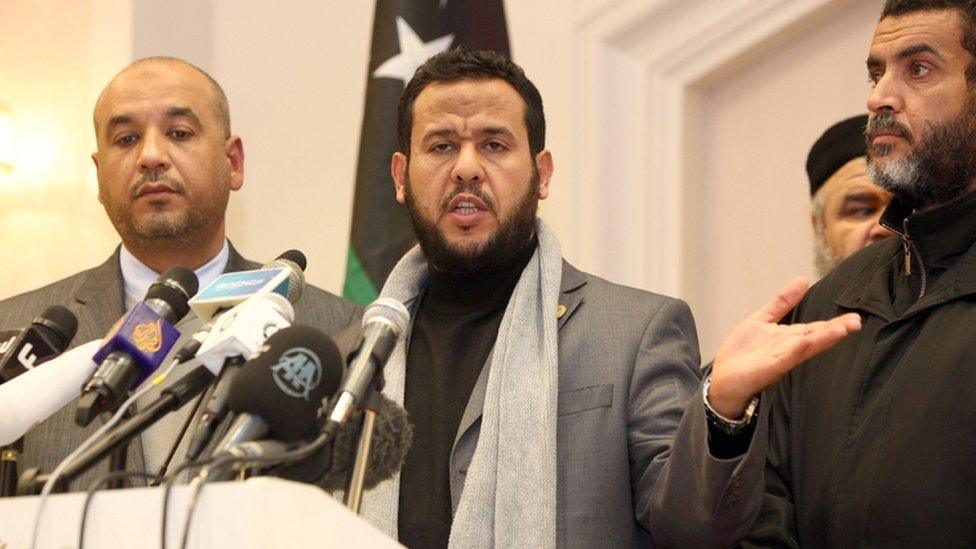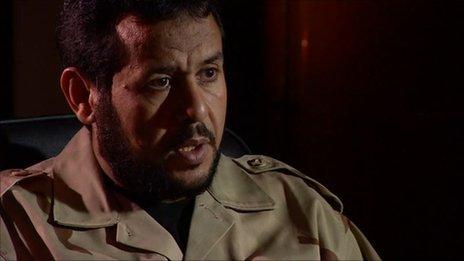UK inquiry into rendition and torture collusion scrapped
- Published
Justice Secretary Ken Clarke: ''The government fully intends to hold a judge-led inquiry into these issues''
A controversial inquiry into allegations of wrongdoing by the UK's security services is being scrapped.
Justice Secretary Ken Clarke said the inquiry into the treatment of detainees could not continue because of a new Metropolitan Police investigation.
These follow fresh allegations that officials assisted the rendition of men to Libya, where they were tortured.
Mr Clarke said the government was committed to holding a judge-led inquiry once these were investigated.
The Detainee Inquiry, headed by retired judge Sir Peter Gibson, was launched by the prime minister to get to the bottom of claims that MI5 and MI6 had aided and abetted the rendition and ill-treatment of terrorism suspects in the wake of 9/11.
In July 2010 when he announced the "fully independent" inquiry, David Cameron had said that to ignore the claims of wrongdoing would risk secret operatives' reputation "being tarnished".
But the inquiry had been widely criticised by campaign groups and lawyers representing detainees who were refusing to take part, saying it lacked transparency and credibility.
Preliminary report
Speaking in the Commons, Mr Clarke said the inquiry could not continue because the new police investigations would be so lengthy.
He told MPs: "There now appears no prospect of the Gibson Inquiry being able to start in the foreseeable future.
"So, following consultation with Sir Peter Gibson, the inquiry chair, we have decided to bring the work of this inquiry to a conclusion."
He added: "The government fully intends to hold an independent, judge-led inquiry, once all police investigations have concluded, to establish the full facts and draw a line under these issues."
Scotland Yard took three years looking into the cases of Guantanamo Bay detainees, he said.
Sir Peter said he regretted the inquiry would not be completed but agreed it was not practical to continue for an indefinite period.
He said a large amount of preliminary work had already been completed, including the collation of many documents from government departments and the security and intelligence agencies, which it would draw together in a report.
"This task now set for us remains an important one: it will ensure that the work we have done is not wasted and we hope that it will materially assist the future inquiry that the government intends to establish," he said.
The move was welcomed by campaign groups including Amnesty International, which said it was "time for the UK government to come clean about the past, and to be seen to do so".
Its Europe and Central Asia director Nicola Duckworth said: "The detainee inquiry was never fit for purpose, and fell short of the UK's international human rights obligations to fully and independently investigate allegations of UK involvement in torture and ill-treatment.
"We hope that the government seizes the opportunity presented by the mounting allegations of UK involvement, the ongoing criminal investigations into specific cases, and the report of the Detainee Inquiry's work to date, to establish a human rights-compliant inquiry that ensures real accountability."
'Real independence'
Clare Algar, executive director of Reprieve, said the inquiry "simply did not have the powers or the independence to get to the truth".
"We therefore look forward to working with the government to ensure that an inquiry with real clout and real independence is established once these investigations have concluded," she said.
In the Commons, Jack Straw, foreign secretary from 2001 to 2006, said Mr Clarke's decision to end the current inquiry was "absolutely right" and added that he "perhaps had no alternative".
The new police investigation follows claims by Abdel Hakim Belhadj, a commander of the former rebel forces in Libya, who says he was tortured after being arrested in 2004.
He says he was taken from Bangkok to Libya by a joint CIA and MI6 operation which was set up to help Col Muammar Gaddafi round up his enemies.
In an interview with BBC Newsnight, Mr Belhadj welcomed the new investigation by British police.
"Those who have contributed to this, those who have harmed us, and the people who elected them - they committed this crime while pretending to protect human rights - we want to see them brought to justice. "
'Years of suffering'
Speaking from Tripoli, Mr Belhadj claimed he had been questioned by British intelligence services and handed over to be tortured in Libya.

Abdel Hakim Belhaj says UK and US intelligence were involved in sending him to Libya
He said he was later visited by British intelligence services in Libya, who he claimed had knowledge that he was being tortured but did nothing.
Mr Belhadj claimed he was held for a year-and-a-half in a cell with no daylight, he was not allowed to bathe or shower, was subjected to protracted investigations, and that his wife was also subjected to ill-treatment.
"I do harbour ill-feelings towards those who contributed towards this act - the years of suffering and ill-treatment - and of my wife, who was pregnant," he said.
"I hope our relations between our two countries will be consolidated and improved and we will have relations based on mutual respect."
He told Newsnight he had not yet met any British police officers involved in the new investigation.
When asked if he would come to the UK to give evidence, he said the matter was in the hands of his legal team.
In the second Libyan case, Sami al-Saadi has made similar allegations of British collusion in rendition and is demanding damages for the torture he says he suffered in one of Gaddafi's prisons.
- Published10 May 2018

- Published5 September 2011

- Published12 January 2012
